A Literature Review on Nutrition for Dementia Patients in the UK
VerifiedAdded on 2023/06/03
|11
|2822
|229
Literature Review
AI Summary
This literature review explores the critical role of nutrition in managing dementia patients in the UK, where a significant portion of the population is affected by this condition. It delves into the challenges of maintaining healthy weight and addressing eating and drinking difficulties common among dementia sufferers. The review analyzes Rosemarie Rizzo Parse’s Theory of Human Becoming to improve patient-nurse interaction and health outcomes. It focuses on the research question of identifying the main causes of poor nutrition in dementia patients and aims to evaluate nursing practices to overcome malnutrition. Objectives include setting high nutritional standards and reducing dementia cases through professional nursing care. The methodology involves a systematic literature review, data collection from sources like Nelli and Ebsco, and data analysis to identify prominent patterns and themes. The review also includes a personal reflection on the author's learning experience and skill development throughout the research process.
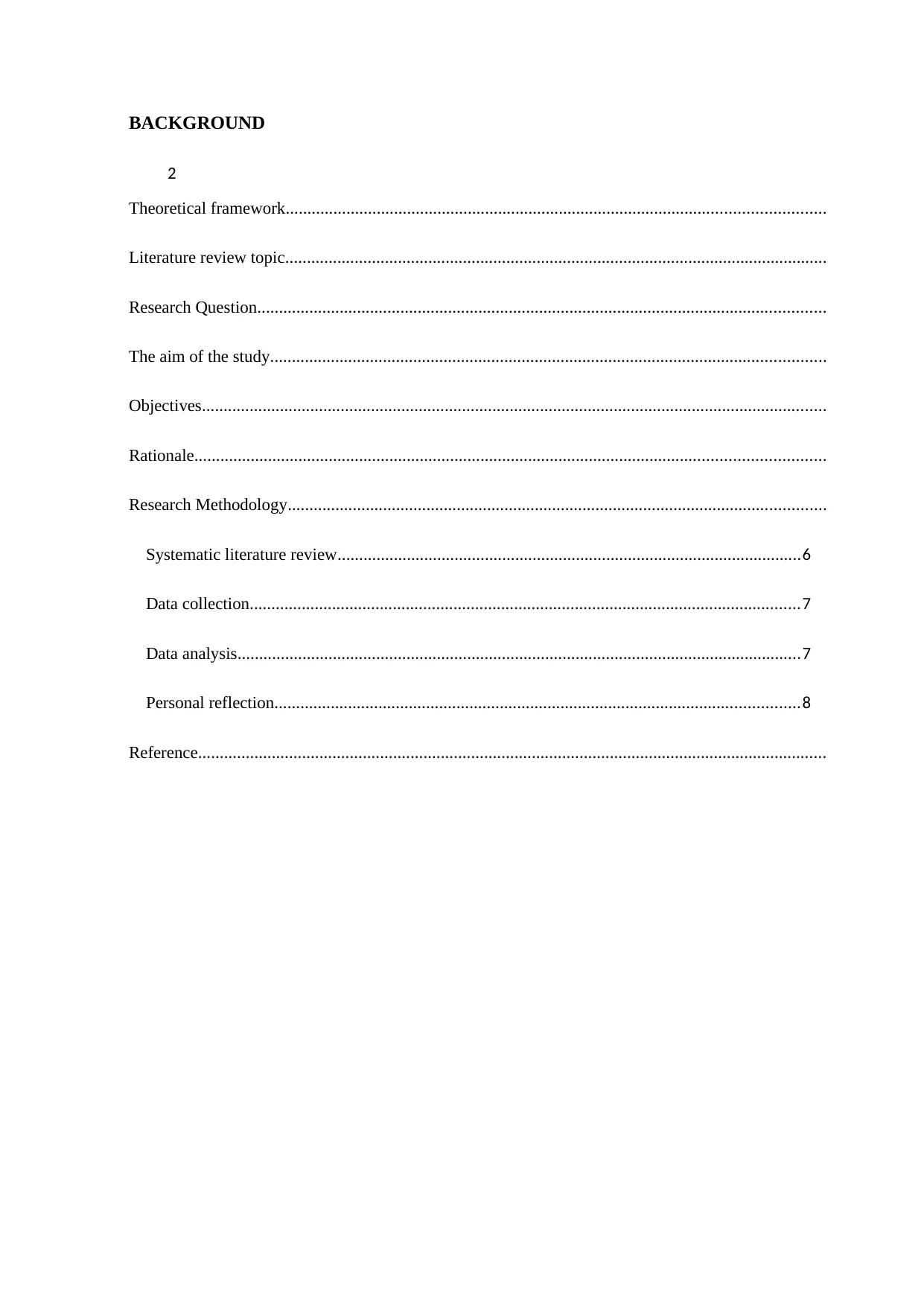
BACKGROUND
2
Theoretical framework............................................................................................................................
Literature review topic.............................................................................................................................
Research Question...................................................................................................................................
The aim of the study................................................................................................................................
Objectives................................................................................................................................................
Rationale.................................................................................................................................................
Research Methodology............................................................................................................................
Systematic literature review...........................................................................................................6
Data collection...............................................................................................................................7
Data analysis..................................................................................................................................7
Personal reflection.........................................................................................................................8
Reference.................................................................................................................................................
2
Theoretical framework............................................................................................................................
Literature review topic.............................................................................................................................
Research Question...................................................................................................................................
The aim of the study................................................................................................................................
Objectives................................................................................................................................................
Rationale.................................................................................................................................................
Research Methodology............................................................................................................................
Systematic literature review...........................................................................................................6
Data collection...............................................................................................................................7
Data analysis..................................................................................................................................7
Personal reflection.........................................................................................................................8
Reference.................................................................................................................................................
Paraphrase This Document
Need a fresh take? Get an instant paraphrase of this document with our AI Paraphraser
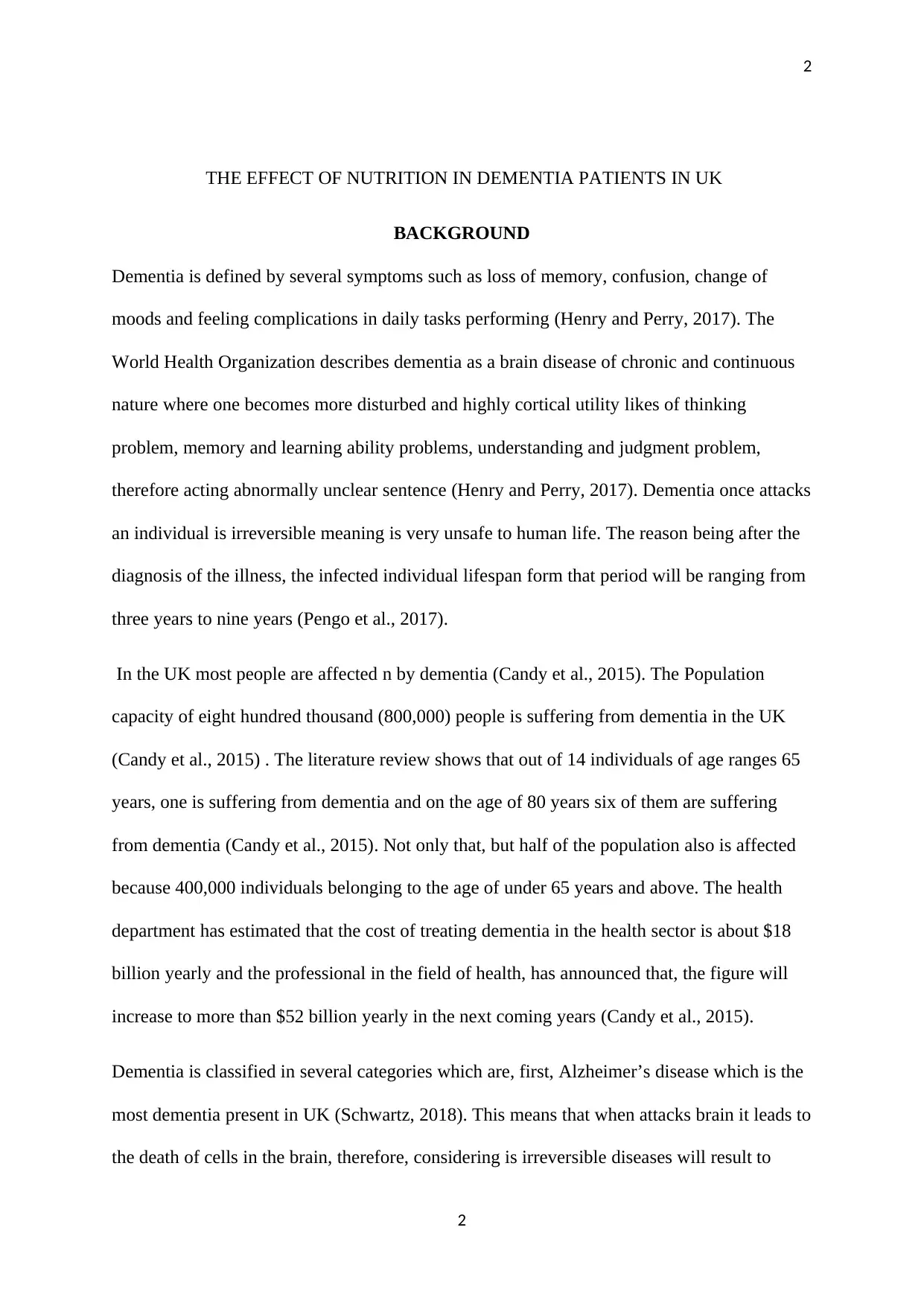
2
THE EFFECT OF NUTRITION IN DEMENTIA PATIENTS IN UK
BACKGROUND
Dementia is defined by several symptoms such as loss of memory, confusion, change of
moods and feeling complications in daily tasks performing (Henry and Perry, 2017). The
World Health Organization describes dementia as a brain disease of chronic and continuous
nature where one becomes more disturbed and highly cortical utility likes of thinking
problem, memory and learning ability problems, understanding and judgment problem,
therefore acting abnormally unclear sentence (Henry and Perry, 2017). Dementia once attacks
an individual is irreversible meaning is very unsafe to human life. The reason being after the
diagnosis of the illness, the infected individual lifespan form that period will be ranging from
three years to nine years (Pengo et al., 2017).
In the UK most people are affected n by dementia (Candy et al., 2015). The Population
capacity of eight hundred thousand (800,000) people is suffering from dementia in the UK
(Candy et al., 2015) . The literature review shows that out of 14 individuals of age ranges 65
years, one is suffering from dementia and on the age of 80 years six of them are suffering
from dementia (Candy et al., 2015). Not only that, but half of the population also is affected
because 400,000 individuals belonging to the age of under 65 years and above. The health
department has estimated that the cost of treating dementia in the health sector is about $18
billion yearly and the professional in the field of health, has announced that, the figure will
increase to more than $52 billion yearly in the next coming years (Candy et al., 2015).
Dementia is classified in several categories which are, first, Alzheimer’s disease which is the
most dementia present in UK (Schwartz, 2018). This means that when attacks brain it leads to
the death of cells in the brain, therefore, considering is irreversible diseases will result to
2
THE EFFECT OF NUTRITION IN DEMENTIA PATIENTS IN UK
BACKGROUND
Dementia is defined by several symptoms such as loss of memory, confusion, change of
moods and feeling complications in daily tasks performing (Henry and Perry, 2017). The
World Health Organization describes dementia as a brain disease of chronic and continuous
nature where one becomes more disturbed and highly cortical utility likes of thinking
problem, memory and learning ability problems, understanding and judgment problem,
therefore acting abnormally unclear sentence (Henry and Perry, 2017). Dementia once attacks
an individual is irreversible meaning is very unsafe to human life. The reason being after the
diagnosis of the illness, the infected individual lifespan form that period will be ranging from
three years to nine years (Pengo et al., 2017).
In the UK most people are affected n by dementia (Candy et al., 2015). The Population
capacity of eight hundred thousand (800,000) people is suffering from dementia in the UK
(Candy et al., 2015) . The literature review shows that out of 14 individuals of age ranges 65
years, one is suffering from dementia and on the age of 80 years six of them are suffering
from dementia (Candy et al., 2015). Not only that, but half of the population also is affected
because 400,000 individuals belonging to the age of under 65 years and above. The health
department has estimated that the cost of treating dementia in the health sector is about $18
billion yearly and the professional in the field of health, has announced that, the figure will
increase to more than $52 billion yearly in the next coming years (Candy et al., 2015).
Dementia is classified in several categories which are, first, Alzheimer’s disease which is the
most dementia present in UK (Schwartz, 2018). This means that when attacks brain it leads to
the death of cells in the brain, therefore, considering is irreversible diseases will result to
2
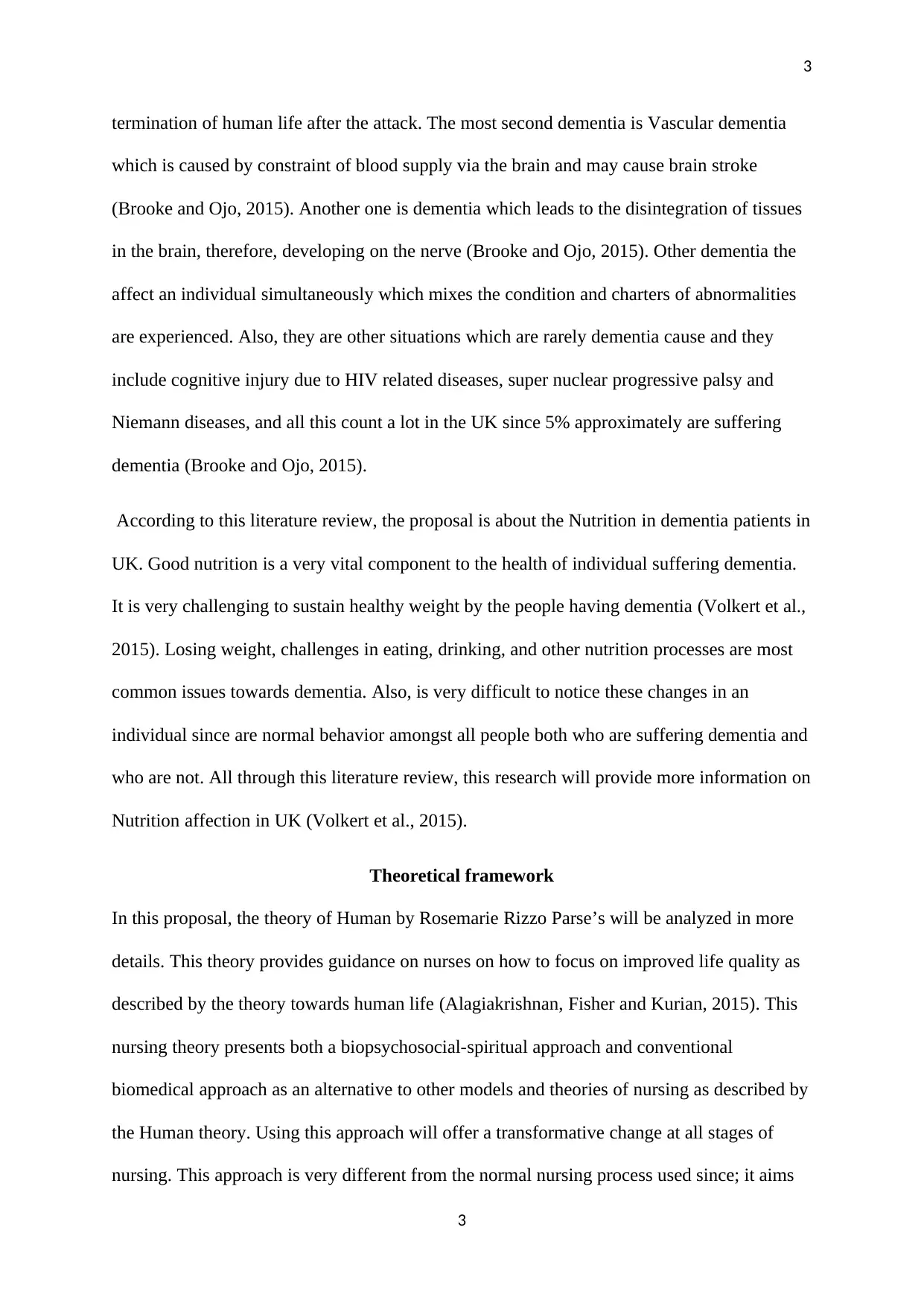
3
termination of human life after the attack. The most second dementia is Vascular dementia
which is caused by constraint of blood supply via the brain and may cause brain stroke
(Brooke and Ojo, 2015). Another one is dementia which leads to the disintegration of tissues
in the brain, therefore, developing on the nerve (Brooke and Ojo, 2015). Other dementia the
affect an individual simultaneously which mixes the condition and charters of abnormalities
are experienced. Also, they are other situations which are rarely dementia cause and they
include cognitive injury due to HIV related diseases, super nuclear progressive palsy and
Niemann diseases, and all this count a lot in the UK since 5% approximately are suffering
dementia (Brooke and Ojo, 2015).
According to this literature review, the proposal is about the Nutrition in dementia patients in
UK. Good nutrition is a very vital component to the health of individual suffering dementia.
It is very challenging to sustain healthy weight by the people having dementia (Volkert et al.,
2015). Losing weight, challenges in eating, drinking, and other nutrition processes are most
common issues towards dementia. Also, is very difficult to notice these changes in an
individual since are normal behavior amongst all people both who are suffering dementia and
who are not. All through this literature review, this research will provide more information on
Nutrition affection in UK (Volkert et al., 2015).
Theoretical framework
In this proposal, the theory of Human by Rosemarie Rizzo Parse’s will be analyzed in more
details. This theory provides guidance on nurses on how to focus on improved life quality as
described by the theory towards human life (Alagiakrishnan, Fisher and Kurian, 2015). This
nursing theory presents both a biopsychosocial-spiritual approach and conventional
biomedical approach as an alternative to other models and theories of nursing as described by
the Human theory. Using this approach will offer a transformative change at all stages of
nursing. This approach is very different from the normal nursing process used since; it aims
3
termination of human life after the attack. The most second dementia is Vascular dementia
which is caused by constraint of blood supply via the brain and may cause brain stroke
(Brooke and Ojo, 2015). Another one is dementia which leads to the disintegration of tissues
in the brain, therefore, developing on the nerve (Brooke and Ojo, 2015). Other dementia the
affect an individual simultaneously which mixes the condition and charters of abnormalities
are experienced. Also, they are other situations which are rarely dementia cause and they
include cognitive injury due to HIV related diseases, super nuclear progressive palsy and
Niemann diseases, and all this count a lot in the UK since 5% approximately are suffering
dementia (Brooke and Ojo, 2015).
According to this literature review, the proposal is about the Nutrition in dementia patients in
UK. Good nutrition is a very vital component to the health of individual suffering dementia.
It is very challenging to sustain healthy weight by the people having dementia (Volkert et al.,
2015). Losing weight, challenges in eating, drinking, and other nutrition processes are most
common issues towards dementia. Also, is very difficult to notice these changes in an
individual since are normal behavior amongst all people both who are suffering dementia and
who are not. All through this literature review, this research will provide more information on
Nutrition affection in UK (Volkert et al., 2015).
Theoretical framework
In this proposal, the theory of Human by Rosemarie Rizzo Parse’s will be analyzed in more
details. This theory provides guidance on nurses on how to focus on improved life quality as
described by the theory towards human life (Alagiakrishnan, Fisher and Kurian, 2015). This
nursing theory presents both a biopsychosocial-spiritual approach and conventional
biomedical approach as an alternative to other models and theories of nursing as described by
the Human theory. Using this approach will offer a transformative change at all stages of
nursing. This approach is very different from the normal nursing process used since; it aims
3
⊘ This is a preview!⊘
Do you want full access?
Subscribe today to unlock all pages.

Trusted by 1+ million students worldwide
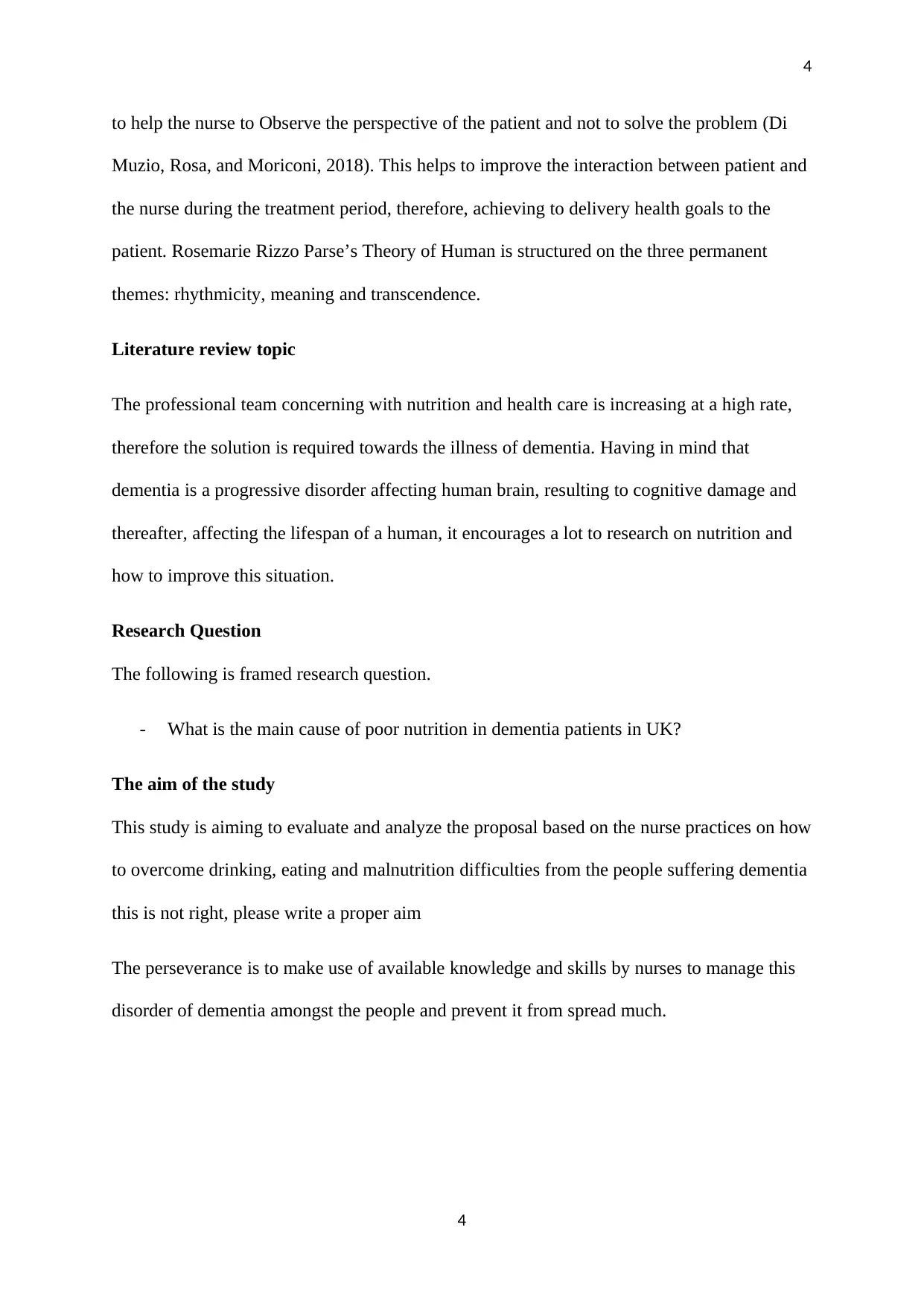
4
to help the nurse to Observe the perspective of the patient and not to solve the problem (Di
Muzio, Rosa, and Moriconi, 2018). This helps to improve the interaction between patient and
the nurse during the treatment period, therefore, achieving to delivery health goals to the
patient. Rosemarie Rizzo Parse’s Theory of Human is structured on the three permanent
themes: rhythmicity, meaning and transcendence.
Literature review topic
The professional team concerning with nutrition and health care is increasing at a high rate,
therefore the solution is required towards the illness of dementia. Having in mind that
dementia is a progressive disorder affecting human brain, resulting to cognitive damage and
thereafter, affecting the lifespan of a human, it encourages a lot to research on nutrition and
how to improve this situation.
Research Question
The following is framed research question.
- What is the main cause of poor nutrition in dementia patients in UK?
The aim of the study
This study is aiming to evaluate and analyze the proposal based on the nurse practices on how
to overcome drinking, eating and malnutrition difficulties from the people suffering dementia
this is not right, please write a proper aim
The perseverance is to make use of available knowledge and skills by nurses to manage this
disorder of dementia amongst the people and prevent it from spread much.
4
to help the nurse to Observe the perspective of the patient and not to solve the problem (Di
Muzio, Rosa, and Moriconi, 2018). This helps to improve the interaction between patient and
the nurse during the treatment period, therefore, achieving to delivery health goals to the
patient. Rosemarie Rizzo Parse’s Theory of Human is structured on the three permanent
themes: rhythmicity, meaning and transcendence.
Literature review topic
The professional team concerning with nutrition and health care is increasing at a high rate,
therefore the solution is required towards the illness of dementia. Having in mind that
dementia is a progressive disorder affecting human brain, resulting to cognitive damage and
thereafter, affecting the lifespan of a human, it encourages a lot to research on nutrition and
how to improve this situation.
Research Question
The following is framed research question.
- What is the main cause of poor nutrition in dementia patients in UK?
The aim of the study
This study is aiming to evaluate and analyze the proposal based on the nurse practices on how
to overcome drinking, eating and malnutrition difficulties from the people suffering dementia
this is not right, please write a proper aim
The perseverance is to make use of available knowledge and skills by nurses to manage this
disorder of dementia amongst the people and prevent it from spread much.
4
Paraphrase This Document
Need a fresh take? Get an instant paraphrase of this document with our AI Paraphraser
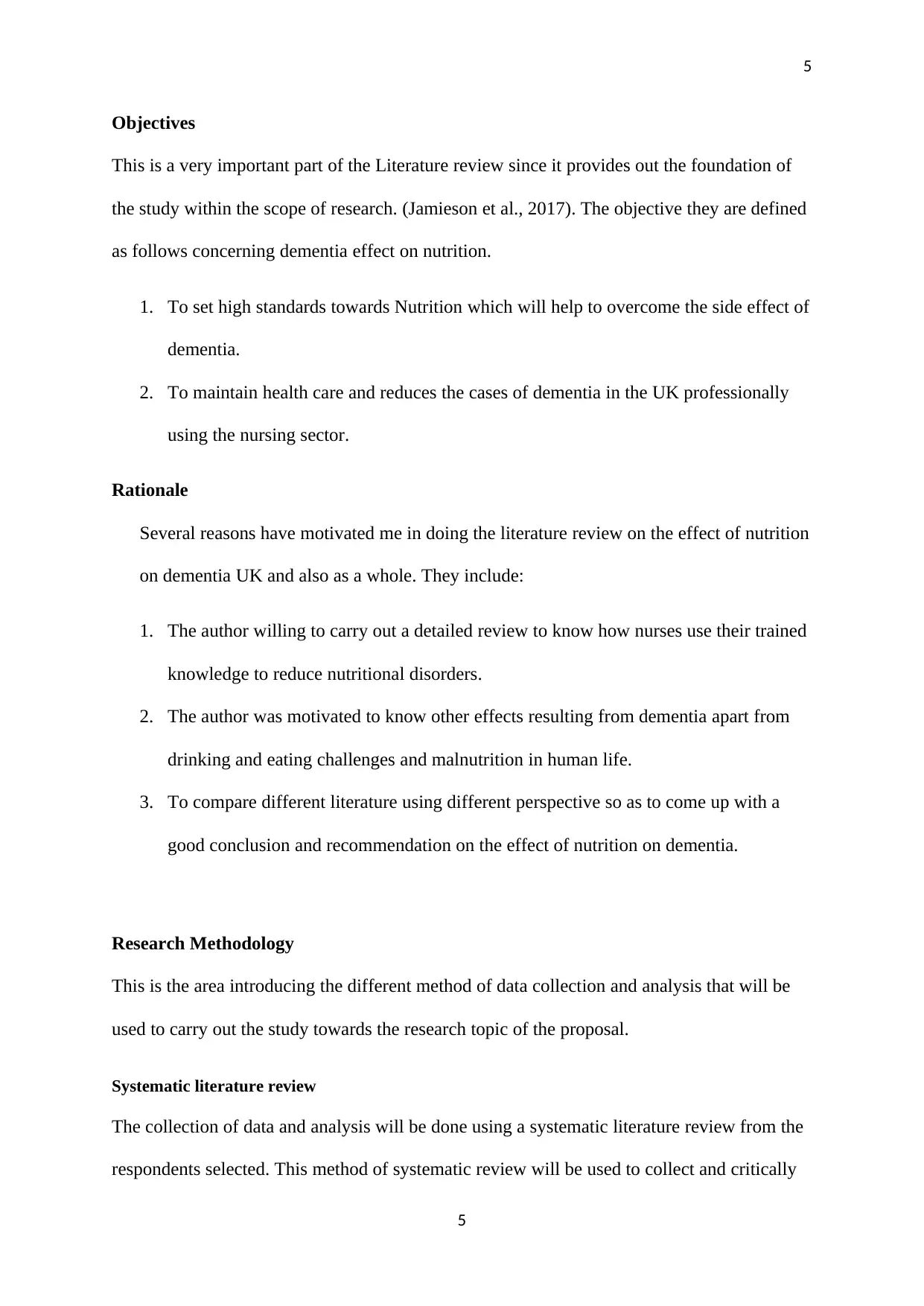
5
Objectives
This is a very important part of the Literature review since it provides out the foundation of
the study within the scope of research. (Jamieson et al., 2017). The objective they are defined
as follows concerning dementia effect on nutrition.
1. To set high standards towards Nutrition which will help to overcome the side effect of
dementia.
2. To maintain health care and reduces the cases of dementia in the UK professionally
using the nursing sector.
Rationale
Several reasons have motivated me in doing the literature review on the effect of nutrition
on dementia UK and also as a whole. They include:
1. The author willing to carry out a detailed review to know how nurses use their trained
knowledge to reduce nutritional disorders.
2. The author was motivated to know other effects resulting from dementia apart from
drinking and eating challenges and malnutrition in human life.
3. To compare different literature using different perspective so as to come up with a
good conclusion and recommendation on the effect of nutrition on dementia.
Research Methodology
This is the area introducing the different method of data collection and analysis that will be
used to carry out the study towards the research topic of the proposal.
Systematic literature review
The collection of data and analysis will be done using a systematic literature review from the
respondents selected. This method of systematic review will be used to collect and critically
5
Objectives
This is a very important part of the Literature review since it provides out the foundation of
the study within the scope of research. (Jamieson et al., 2017). The objective they are defined
as follows concerning dementia effect on nutrition.
1. To set high standards towards Nutrition which will help to overcome the side effect of
dementia.
2. To maintain health care and reduces the cases of dementia in the UK professionally
using the nursing sector.
Rationale
Several reasons have motivated me in doing the literature review on the effect of nutrition
on dementia UK and also as a whole. They include:
1. The author willing to carry out a detailed review to know how nurses use their trained
knowledge to reduce nutritional disorders.
2. The author was motivated to know other effects resulting from dementia apart from
drinking and eating challenges and malnutrition in human life.
3. To compare different literature using different perspective so as to come up with a
good conclusion and recommendation on the effect of nutrition on dementia.
Research Methodology
This is the area introducing the different method of data collection and analysis that will be
used to carry out the study towards the research topic of the proposal.
Systematic literature review
The collection of data and analysis will be done using a systematic literature review from the
respondents selected. This method of systematic review will be used to collect and critically
5
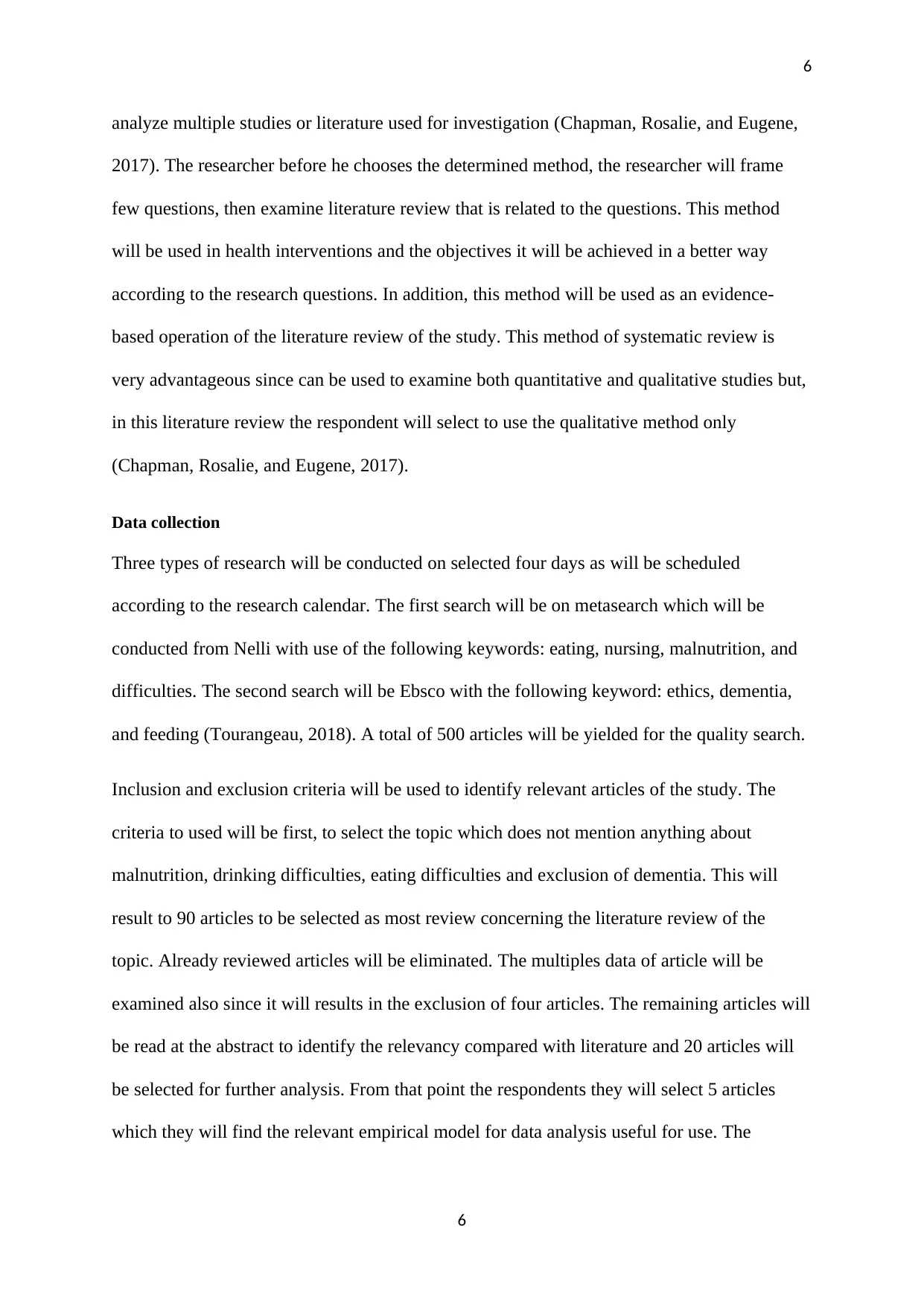
6
analyze multiple studies or literature used for investigation (Chapman, Rosalie, and Eugene,
2017). The researcher before he chooses the determined method, the researcher will frame
few questions, then examine literature review that is related to the questions. This method
will be used in health interventions and the objectives it will be achieved in a better way
according to the research questions. In addition, this method will be used as an evidence-
based operation of the literature review of the study. This method of systematic review is
very advantageous since can be used to examine both quantitative and qualitative studies but,
in this literature review the respondent will select to use the qualitative method only
(Chapman, Rosalie, and Eugene, 2017).
Data collection
Three types of research will be conducted on selected four days as will be scheduled
according to the research calendar. The first search will be on metasearch which will be
conducted from Nelli with use of the following keywords: eating, nursing, malnutrition, and
difficulties. The second search will be Ebsco with the following keyword: ethics, dementia,
and feeding (Tourangeau, 2018). A total of 500 articles will be yielded for the quality search.
Inclusion and exclusion criteria will be used to identify relevant articles of the study. The
criteria to used will be first, to select the topic which does not mention anything about
malnutrition, drinking difficulties, eating difficulties and exclusion of dementia. This will
result to 90 articles to be selected as most review concerning the literature review of the
topic. Already reviewed articles will be eliminated. The multiples data of article will be
examined also since it will results in the exclusion of four articles. The remaining articles will
be read at the abstract to identify the relevancy compared with literature and 20 articles will
be selected for further analysis. From that point the respondents they will select 5 articles
which they will find the relevant empirical model for data analysis useful for use. The
6
analyze multiple studies or literature used for investigation (Chapman, Rosalie, and Eugene,
2017). The researcher before he chooses the determined method, the researcher will frame
few questions, then examine literature review that is related to the questions. This method
will be used in health interventions and the objectives it will be achieved in a better way
according to the research questions. In addition, this method will be used as an evidence-
based operation of the literature review of the study. This method of systematic review is
very advantageous since can be used to examine both quantitative and qualitative studies but,
in this literature review the respondent will select to use the qualitative method only
(Chapman, Rosalie, and Eugene, 2017).
Data collection
Three types of research will be conducted on selected four days as will be scheduled
according to the research calendar. The first search will be on metasearch which will be
conducted from Nelli with use of the following keywords: eating, nursing, malnutrition, and
difficulties. The second search will be Ebsco with the following keyword: ethics, dementia,
and feeding (Tourangeau, 2018). A total of 500 articles will be yielded for the quality search.
Inclusion and exclusion criteria will be used to identify relevant articles of the study. The
criteria to used will be first, to select the topic which does not mention anything about
malnutrition, drinking difficulties, eating difficulties and exclusion of dementia. This will
result to 90 articles to be selected as most review concerning the literature review of the
topic. Already reviewed articles will be eliminated. The multiples data of article will be
examined also since it will results in the exclusion of four articles. The remaining articles will
be read at the abstract to identify the relevancy compared with literature and 20 articles will
be selected for further analysis. From that point the respondents they will select 5 articles
which they will find the relevant empirical model for data analysis useful for use. The
6
⊘ This is a preview!⊘
Do you want full access?
Subscribe today to unlock all pages.

Trusted by 1+ million students worldwide
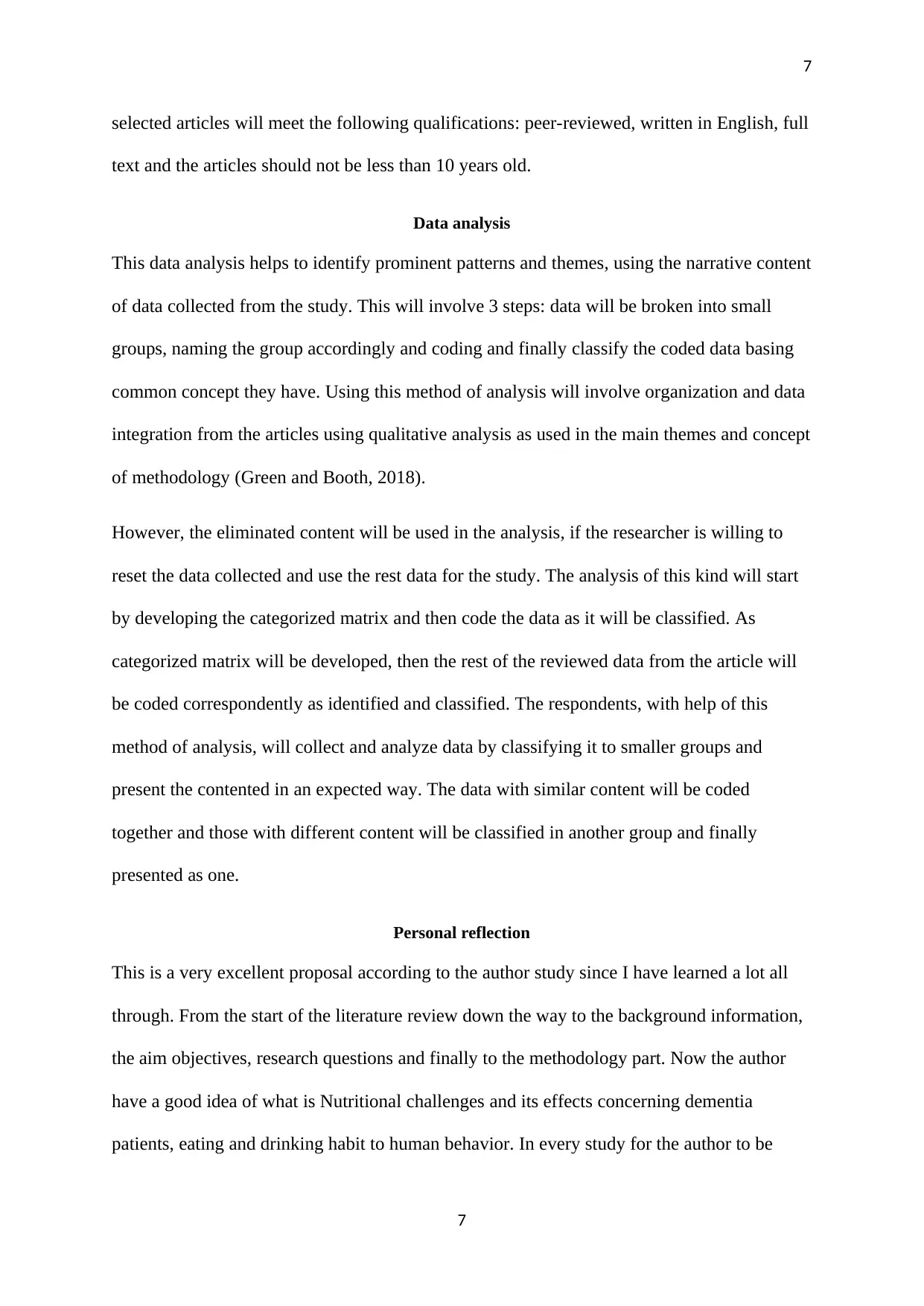
7
selected articles will meet the following qualifications: peer-reviewed, written in English, full
text and the articles should not be less than 10 years old.
Data analysis
This data analysis helps to identify prominent patterns and themes, using the narrative content
of data collected from the study. This will involve 3 steps: data will be broken into small
groups, naming the group accordingly and coding and finally classify the coded data basing
common concept they have. Using this method of analysis will involve organization and data
integration from the articles using qualitative analysis as used in the main themes and concept
of methodology (Green and Booth, 2018).
However, the eliminated content will be used in the analysis, if the researcher is willing to
reset the data collected and use the rest data for the study. The analysis of this kind will start
by developing the categorized matrix and then code the data as it will be classified. As
categorized matrix will be developed, then the rest of the reviewed data from the article will
be coded correspondently as identified and classified. The respondents, with help of this
method of analysis, will collect and analyze data by classifying it to smaller groups and
present the contented in an expected way. The data with similar content will be coded
together and those with different content will be classified in another group and finally
presented as one.
Personal reflection
This is a very excellent proposal according to the author study since I have learned a lot all
through. From the start of the literature review down the way to the background information,
the aim objectives, research questions and finally to the methodology part. Now the author
have a good idea of what is Nutritional challenges and its effects concerning dementia
patients, eating and drinking habit to human behavior. In every study for the author to be
7
selected articles will meet the following qualifications: peer-reviewed, written in English, full
text and the articles should not be less than 10 years old.
Data analysis
This data analysis helps to identify prominent patterns and themes, using the narrative content
of data collected from the study. This will involve 3 steps: data will be broken into small
groups, naming the group accordingly and coding and finally classify the coded data basing
common concept they have. Using this method of analysis will involve organization and data
integration from the articles using qualitative analysis as used in the main themes and concept
of methodology (Green and Booth, 2018).
However, the eliminated content will be used in the analysis, if the researcher is willing to
reset the data collected and use the rest data for the study. The analysis of this kind will start
by developing the categorized matrix and then code the data as it will be classified. As
categorized matrix will be developed, then the rest of the reviewed data from the article will
be coded correspondently as identified and classified. The respondents, with help of this
method of analysis, will collect and analyze data by classifying it to smaller groups and
present the contented in an expected way. The data with similar content will be coded
together and those with different content will be classified in another group and finally
presented as one.
Personal reflection
This is a very excellent proposal according to the author study since I have learned a lot all
through. From the start of the literature review down the way to the background information,
the aim objectives, research questions and finally to the methodology part. Now the author
have a good idea of what is Nutritional challenges and its effects concerning dementia
patients, eating and drinking habit to human behavior. In every study for the author to be
7
Paraphrase This Document
Need a fresh take? Get an instant paraphrase of this document with our AI Paraphraser
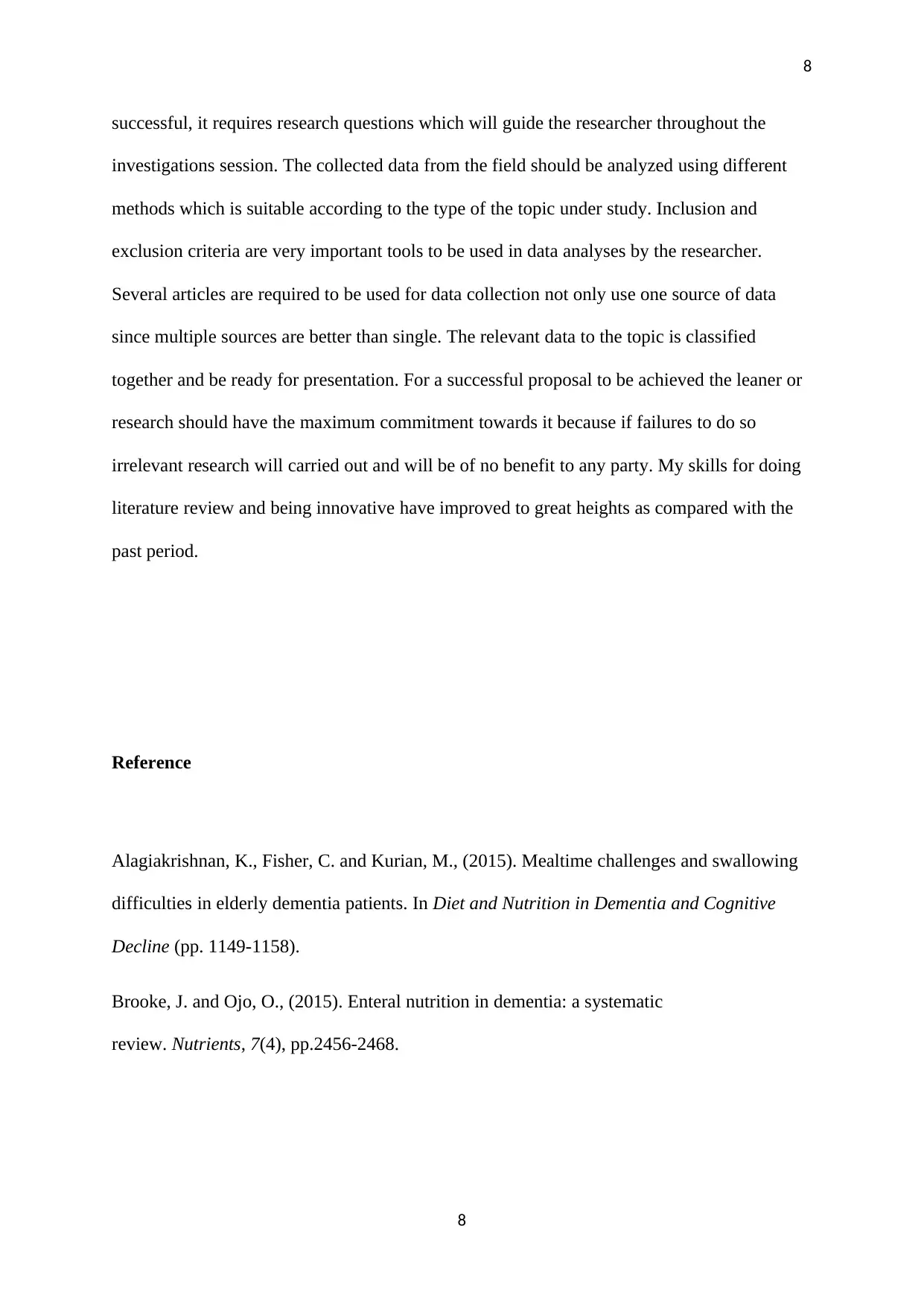
8
successful, it requires research questions which will guide the researcher throughout the
investigations session. The collected data from the field should be analyzed using different
methods which is suitable according to the type of the topic under study. Inclusion and
exclusion criteria are very important tools to be used in data analyses by the researcher.
Several articles are required to be used for data collection not only use one source of data
since multiple sources are better than single. The relevant data to the topic is classified
together and be ready for presentation. For a successful proposal to be achieved the leaner or
research should have the maximum commitment towards it because if failures to do so
irrelevant research will carried out and will be of no benefit to any party. My skills for doing
literature review and being innovative have improved to great heights as compared with the
past period.
Reference
Alagiakrishnan, K., Fisher, C. and Kurian, M., (2015). Mealtime challenges and swallowing
difficulties in elderly dementia patients. In Diet and Nutrition in Dementia and Cognitive
Decline (pp. 1149-1158).
Brooke, J. and Ojo, O., (2015). Enteral nutrition in dementia: a systematic
review. Nutrients, 7(4), pp.2456-2468.
8
successful, it requires research questions which will guide the researcher throughout the
investigations session. The collected data from the field should be analyzed using different
methods which is suitable according to the type of the topic under study. Inclusion and
exclusion criteria are very important tools to be used in data analyses by the researcher.
Several articles are required to be used for data collection not only use one source of data
since multiple sources are better than single. The relevant data to the topic is classified
together and be ready for presentation. For a successful proposal to be achieved the leaner or
research should have the maximum commitment towards it because if failures to do so
irrelevant research will carried out and will be of no benefit to any party. My skills for doing
literature review and being innovative have improved to great heights as compared with the
past period.
Reference
Alagiakrishnan, K., Fisher, C. and Kurian, M., (2015). Mealtime challenges and swallowing
difficulties in elderly dementia patients. In Diet and Nutrition in Dementia and Cognitive
Decline (pp. 1149-1158).
Brooke, J. and Ojo, O., (2015). Enteral nutrition in dementia: a systematic
review. Nutrients, 7(4), pp.2456-2468.
8
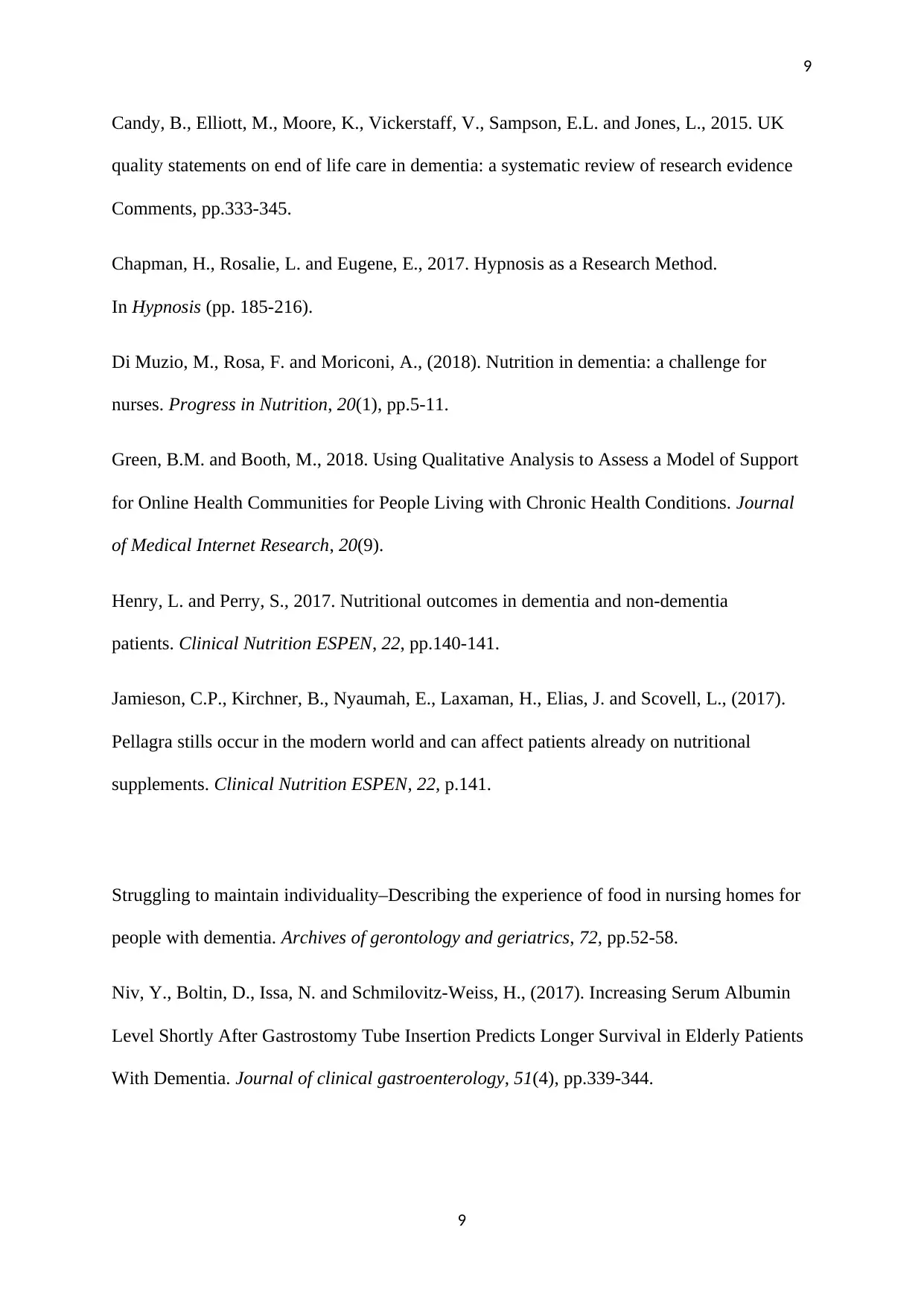
9
Candy, B., Elliott, M., Moore, K., Vickerstaff, V., Sampson, E.L. and Jones, L., 2015. UK
quality statements on end of life care in dementia: a systematic review of research evidence
Comments, pp.333-345.
Chapman, H., Rosalie, L. and Eugene, E., 2017. Hypnosis as a Research Method.
In Hypnosis (pp. 185-216).
Di Muzio, M., Rosa, F. and Moriconi, A., (2018). Nutrition in dementia: a challenge for
nurses. Progress in Nutrition, 20(1), pp.5-11.
Green, B.M. and Booth, M., 2018. Using Qualitative Analysis to Assess a Model of Support
for Online Health Communities for People Living with Chronic Health Conditions. Journal
of Medical Internet Research, 20(9).
Henry, L. and Perry, S., 2017. Nutritional outcomes in dementia and non-dementia
patients. Clinical Nutrition ESPEN, 22, pp.140-141.
Jamieson, C.P., Kirchner, B., Nyaumah, E., Laxaman, H., Elias, J. and Scovell, L., (2017).
Pellagra stills occur in the modern world and can affect patients already on nutritional
supplements. Clinical Nutrition ESPEN, 22, p.141.
Struggling to maintain individuality–Describing the experience of food in nursing homes for
people with dementia. Archives of gerontology and geriatrics, 72, pp.52-58.
Niv, Y., Boltin, D., Issa, N. and Schmilovitz-Weiss, H., (2017). Increasing Serum Albumin
Level Shortly After Gastrostomy Tube Insertion Predicts Longer Survival in Elderly Patients
With Dementia. Journal of clinical gastroenterology, 51(4), pp.339-344.
9
Candy, B., Elliott, M., Moore, K., Vickerstaff, V., Sampson, E.L. and Jones, L., 2015. UK
quality statements on end of life care in dementia: a systematic review of research evidence
Comments, pp.333-345.
Chapman, H., Rosalie, L. and Eugene, E., 2017. Hypnosis as a Research Method.
In Hypnosis (pp. 185-216).
Di Muzio, M., Rosa, F. and Moriconi, A., (2018). Nutrition in dementia: a challenge for
nurses. Progress in Nutrition, 20(1), pp.5-11.
Green, B.M. and Booth, M., 2018. Using Qualitative Analysis to Assess a Model of Support
for Online Health Communities for People Living with Chronic Health Conditions. Journal
of Medical Internet Research, 20(9).
Henry, L. and Perry, S., 2017. Nutritional outcomes in dementia and non-dementia
patients. Clinical Nutrition ESPEN, 22, pp.140-141.
Jamieson, C.P., Kirchner, B., Nyaumah, E., Laxaman, H., Elias, J. and Scovell, L., (2017).
Pellagra stills occur in the modern world and can affect patients already on nutritional
supplements. Clinical Nutrition ESPEN, 22, p.141.
Struggling to maintain individuality–Describing the experience of food in nursing homes for
people with dementia. Archives of gerontology and geriatrics, 72, pp.52-58.
Niv, Y., Boltin, D., Issa, N. and Schmilovitz-Weiss, H., (2017). Increasing Serum Albumin
Level Shortly After Gastrostomy Tube Insertion Predicts Longer Survival in Elderly Patients
With Dementia. Journal of clinical gastroenterology, 51(4), pp.339-344.
9
⊘ This is a preview!⊘
Do you want full access?
Subscribe today to unlock all pages.

Trusted by 1+ million students worldwide
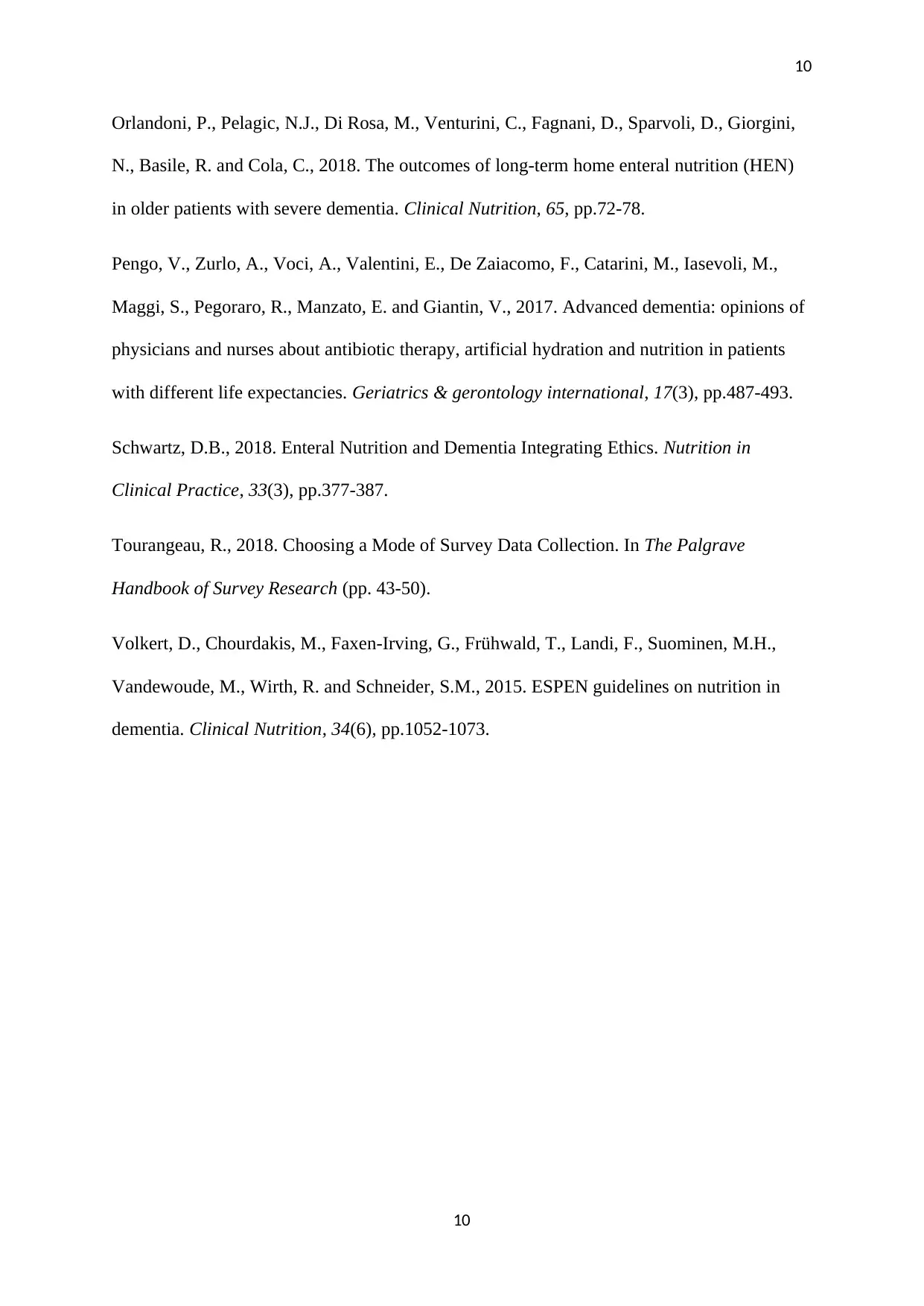
10
Orlandoni, P., Pelagic, N.J., Di Rosa, M., Venturini, C., Fagnani, D., Sparvoli, D., Giorgini,
N., Basile, R. and Cola, C., 2018. The outcomes of long-term home enteral nutrition (HEN)
in older patients with severe dementia. Clinical Nutrition, 65, pp.72-78.
Pengo, V., Zurlo, A., Voci, A., Valentini, E., De Zaiacomo, F., Catarini, M., Iasevoli, M.,
Maggi, S., Pegoraro, R., Manzato, E. and Giantin, V., 2017. Advanced dementia: opinions of
physicians and nurses about antibiotic therapy, artificial hydration and nutrition in patients
with different life expectancies. Geriatrics & gerontology international, 17(3), pp.487-493.
Schwartz, D.B., 2018. Enteral Nutrition and Dementia Integrating Ethics. Nutrition in
Clinical Practice, 33(3), pp.377-387.
Tourangeau, R., 2018. Choosing a Mode of Survey Data Collection. In The Palgrave
Handbook of Survey Research (pp. 43-50).
Volkert, D., Chourdakis, M., Faxen-Irving, G., Frühwald, T., Landi, F., Suominen, M.H.,
Vandewoude, M., Wirth, R. and Schneider, S.M., 2015. ESPEN guidelines on nutrition in
dementia. Clinical Nutrition, 34(6), pp.1052-1073.
10
Orlandoni, P., Pelagic, N.J., Di Rosa, M., Venturini, C., Fagnani, D., Sparvoli, D., Giorgini,
N., Basile, R. and Cola, C., 2018. The outcomes of long-term home enteral nutrition (HEN)
in older patients with severe dementia. Clinical Nutrition, 65, pp.72-78.
Pengo, V., Zurlo, A., Voci, A., Valentini, E., De Zaiacomo, F., Catarini, M., Iasevoli, M.,
Maggi, S., Pegoraro, R., Manzato, E. and Giantin, V., 2017. Advanced dementia: opinions of
physicians and nurses about antibiotic therapy, artificial hydration and nutrition in patients
with different life expectancies. Geriatrics & gerontology international, 17(3), pp.487-493.
Schwartz, D.B., 2018. Enteral Nutrition and Dementia Integrating Ethics. Nutrition in
Clinical Practice, 33(3), pp.377-387.
Tourangeau, R., 2018. Choosing a Mode of Survey Data Collection. In The Palgrave
Handbook of Survey Research (pp. 43-50).
Volkert, D., Chourdakis, M., Faxen-Irving, G., Frühwald, T., Landi, F., Suominen, M.H.,
Vandewoude, M., Wirth, R. and Schneider, S.M., 2015. ESPEN guidelines on nutrition in
dementia. Clinical Nutrition, 34(6), pp.1052-1073.
10
Paraphrase This Document
Need a fresh take? Get an instant paraphrase of this document with our AI Paraphraser

11
11
11
1 out of 11
Related Documents
Your All-in-One AI-Powered Toolkit for Academic Success.
+13062052269
info@desklib.com
Available 24*7 on WhatsApp / Email
![[object Object]](/_next/static/media/star-bottom.7253800d.svg)
Unlock your academic potential
Copyright © 2020–2026 A2Z Services. All Rights Reserved. Developed and managed by ZUCOL.





